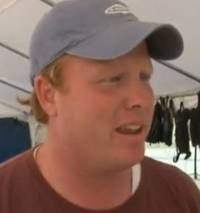A federal judge has denied a request by Utah fraud suspect and Las Vegas and Internet gambling figure Jeremy Johnson that some of his assets be released to cover living expenses and legal costs.
U.S. District Judge Roger Hunt in Las Vegas, in an order dated Friday, noted "inconsistencies" and a "suspicious" transaction in denying the request by Johnson, who was arrested June 11 on a mail fraud charge.
Months before his arrest, Johnson and several of his companies were sued by the Federal Trade Commission in Las Vegas in what the FTC called a scam that cost consumers nationwide $289 million.
The FTC claims Johnson and nine associates operated a "far-reaching Internet enterprise" including I Works Inc. and 60 more companies that "deceptively enrolled unwitting consumers into memberships for products or services and then repeatedly charged their credit cards or debited their bank accounts without consumers’ knowledge or authorization."
Johnson and his codefendants have denied defrauding anyone, but Hunt nevertheless appointed a receiver in January to take control of the assets of Johnson.
In court filings last month, attorneys for Johnson sought release of funds under control of the receiver to, among other things, pay their legal fees and so Johnson could make a monthly mortgage payment of $16,644 to SunFirst Bank in St. George, Utah, for a Johnson home in that city.
The receiver opposed that request, arguing the value of the home is less than what is owed and that the mortgage itself is suspect. That’s because Johnson had extensive business dealings with SunFirst and the mortgage was created to finance the acquisition of $3.4 million worth of bank stock in the name of Johnson’s brother and his parents.
Hunt, in his order Friday, wrote: "Johnson is not entitled to monies that would continue funding a fiscally irresponsible lifestyle."
The judge also questioned the home loan payment, saying the home was "mortgaged through a suspicious and possibly fraudulent transaction."
Hunt questioned assertions Johnson was broke and that he’d been living off of his wife’s savings.
He noted Johnson’s recent spending – including for he and his family to travel back and forth from Utah to Costa Rica -- has far exceeded his wife’s $130,000 in savings that Johnson maintains is depleted.
"Several additional inconsistencies lead the court to believe that Johnson has access to additional assets," Hunt wrote in his order, noting Johnson in a court declaration had failed to mention rental income from a home in Santa Monica, Calif.
Hunt said that with the FTC likely to prevail in its lawsuit against Johnson, allowing Johnson access to funds held by the receiver would reduce the amount of money the FTC can return to harmed consumers.
The receiver last reported holding $737,000 in cash in the Johnson case and is seeking permission to auction off Johnson assets including aircraft, houseboats and real estate.
"Although this amount does not take into account Johnson’s unliquidated assets, the amount available to satisfy consumer injuries is simply a drop in the bucket when compared to the potential liability. Consumers would likely receive pennies on the dollar for their injuries. Under these circumstances, the court finds it inappropriate to pay defense counsel’s fees at this time. Doing so at this juncture could leave consumers without any assets available for redress," Hunt wrote in his order.
As the FTC case in Las Vegas developed, it was revealed Johnson was a high-roller at Wynn Las Vegas who lost $1.35 million there between 2006 and early 2011. He also gambled at MGM Resorts International properties including the MGM Grand, Luxor and Bellagio.
It was also revealed Johnson lost another $1.536 million playing on the Full Tilt Poker website between April and October 2010 and that he did business with Internet poker companies.
Johnson also had business ties with Las Vegas businessman Chad Elie, who was indicted in April’s federal Internet poker crackdown. And SunFirst Bank – which Johnson and Elie did business with – saw its part owner and vice chairman, John Campos, indicted in the same poker crackdown.
